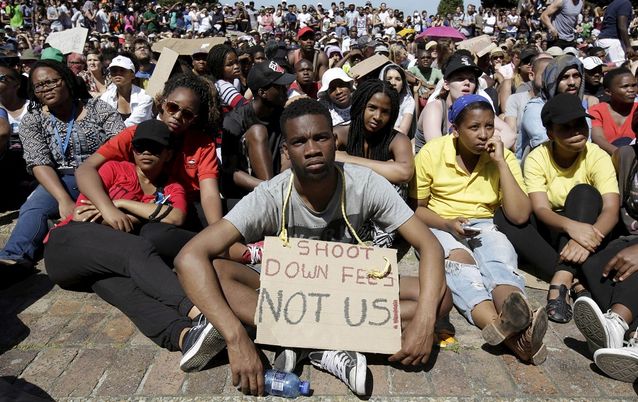As South Africans grapple with the Fees Commission Report of Inquiry into the feasibility of free high education, experts say the report missed the mark. The vice -dean in the Faculty of Education at Stellenbosch University, Professor Aslam Fataar, explains that the report makes recommendations that do not fundamentally address the #FeesMustFall movement’s call for free education. Instead, he asserts, the report is a diagnosis of the problems faced within both basic education and tertiary education.
“The outcome of the report in the way it addressed the problem is that there is now a disagreement between what the student movement wanted, which is no fees, and how the report responded to it by virtue of a set of recommendations.”
He says that the report suggests that the issue of the cost of education needs to be considered within the broader context of public services within the country, as well as education beyond universities.
Fataar notes that the report more broadly speaks to the need for increased funding required within early childhood education, schooling and Technical and Vocational Education Training (TVET) sector.
“Instead of university students getting free fees, what we have to go for is that we have to support no fees for people in the TVET sector,” said Fataar, in explaining the pertinent recommendations of the report.
Commenting on the commission’s recommendations on the National Student Financial Aid Scheme, he says that the funding scheme is an inefficient method of subsidising education.
NSFAS’s qualification criteria is hugely problematic, he said, as the management of NSFAS and the criteria for the payment of loans subsequent to graduating adds more financial burdens onto students.
The commission’s recommendations to assist in dealing with NSFAS, is the inclusion of government guaranteed bank loans and the South African Revenue Service (SARS), ecommendations he considers unattainable and unrealistic, given the structure of the banking of the banking system.
“The bank system does not belong to the government, so to get the banks on board is going to be a mammoth task; banks are interested fundamentally to make a profit off loans. [The report] says that the state will guarantee the loans and presumably will pay them back to the bank with the loans are default.”
Given SARS’ current battles, he said that SARS does not have the capacity to collect loans in the foam of tax once a students is employed.
These recommendations therefore do not speak to the fundamental concerns of students who are unable to afford university fees without being saddled with debt, he said.
Speaking to the concept of ‘cost-sharing’, Fataar says that since university education is both a “public good” and a “private good”, with the potential of benefiting both the country’s economy and the personal quality of life of the individual, both government and families, which are able to afford fees, should be required to contribute to the funding of tertiary education.
“Higher education is a public good; when I send my son or daughter to university, my son or daughter will get the skills to work in the economy and build the country. But, it’s also a private good, because when I get my higher education, I get to boost my life.”
Funding should not be allocated to everyone who seeks a tertiary education. The funding-focus, Fataar said, should exclusively include the poorest of the poor and the middle-class students who are unable to fully afford education.
“My argument would’ve been that if you earn under R150 000 you pay absolutely no fees, if you earn between R150 000 and R500 000 then you pay a portion of your fees relative to your earnings and if you earn over R500 000 you should pay a higher rate of fees that subsidises the poor – this report just does not deal with this in this way.”
With the recommendations of the report still to be adopted, he says that with the current political climate the “situation does not look very promising”.
Commenting on the #FeeMustFall movement, he says that factionalism and the purported infiltration of state security spies within the movement leaves little room for a coherent and unified response to the report.
Fataar suggesting that the report will most likely be challenged by #FeesMustFall in parts of the country, with possible disruptions to be expected over the next six months.
READ MORE:
https://voiceofthecape.wpengine.com/fees-commission-report-summary/
VOC 91.3fm






 WhatsApp us
WhatsApp us 

